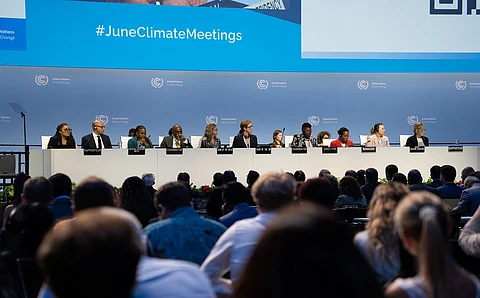

The June Climate Meetings of the United Nations Framework Convention on Climate Change (UNFCCC) held in Bonn, also known as the 62nd meeting of the Subsidiary Bodies (SB 62), are taking place from June 16 to 26, 2025. However, the opening day of the conference saw a failure to gavel the official conference agenda, due to disagreements on items proposed to be added.
Specifically, two agenda items proposed by developing countries: on climate finance and unilateral trade measures, are seeing wide resistance from developed countries. The agenda was finally adopted around 6 PM on Day 2 of the conference, leaving all negotiation items in limbo up until that moment.
In early June, the Like-Minded Developing Countries (LMDC) bloc (which includes India) submitted two new items to add to the Bonn conference agenda: on Article 9.1 of the Paris Agreement and on unilateral trade measures.
On Article 9.1, the submission asked for an agenda track to discuss climate finance and “the ways to implement Article 9.1 in a manner that provides additionality, predictability, concessionality and transparency from developed countries, for developing countries”.
This follows from the outcome of the 29th Conference of Parties to the UNFCCC (COP29) in Baku where a new climate finance goal (New Collective Quantified Goal or NCQG) was agreed as a key outcome — offering $300 billion per year to finance climate action for developing countries, for which developed countries take the lead in mobilisation.
This was nested within a larger goal of $1.3 trillion by 2035, which could come from various sources including the private sector and contributions from willing developing countries. However, the decision offered only ‘mobilisation’ of finance i.e., using public money to crowd in private money or directing funds from other sources. This aligns with Article 9.3 of the Paris Agreement. Article 9.1 was neglected in the Baku decision since developed countries decided to shirk their obligation to directly provide public funds to developing countries — a source with more predictability and accountability than private finance.
On unilateral trade measures such as the EU’s Carbon Border Adjustment Mechanism (CBAM) and similar tools being deployed by the UK and Canada, the LMDCs’ proposed agenda item asked for Parties to “reiterate opposition to the politicisation of climate change issues and all forms of unilateralism and protectionism, recognising that unilateral measures with negative cross border impacts violate the objectives and principles of the UNFCCC and its Paris Agreement”. This follows a similar agenda item that the BASIC (Brazil, China, India and South Africa) group of countries proposed at COP29, but which was then blocked by the EU.
At Bonn, the adoption of the agenda was held up on Day 1 due to developed countries such as the EU and its allies refusing to allow inclusion of these two items, despite the entire G77 and China bloc (representing 130+ developing countries) uniting around the LMDCs’ demands. Discussions moved to closed-door consultations for almost 48 hours, and no bridging proposal was offered by the EU.
On the evening of June 17, the SB Chairs resumed the plenary and stated that the item titled “implementation of Article 9.1 of the PA” would be withdrawn but would be discussed through “substantive consultations” at SB62. The SB Chairs will report back on the outcomes at SB63 which will take place during the 30th Conference of Parties to the UNFCCC (COP30) in Belem, Brazil in November, “for Parties’ consideration with a view to determining a way forward, including potentially a standalone agenda item on this matter”.
On the item titled “Promoting international cooperation and addressing the concerns with climate change-related trade-restrictive unilateral measures”, Parties agreed to withdraw the item “on the understanding related issues will be discussed in relevant agenda items, including the just transition work programme”. Further, a footnote will be added on the Just Transition Work Programme agenda reading “Related issues will be among the issues to be discussed in relevant agenda items, including the just transition work programme”.
The announcement drew the ire of developing countries with Bolivia (on behalf of LMDC) and India expressing disappointment with the reluctance of developed countries to discuss their obligation to provide finance and vowing to return to the item on Article 9.1 at COP30, and Nigeria referring to Article 9.1 as speaking “to the blood of the Convention”.
With the agenda adopted, Day 3 commenced with various items including the Just Transition Work Programme, UAE Dialogue on the Global Stocktake, consultations on the Baku to Belem Roadmap on climate finance, and the Sharm El-Sheikh Dialogue on Article 2.1c.